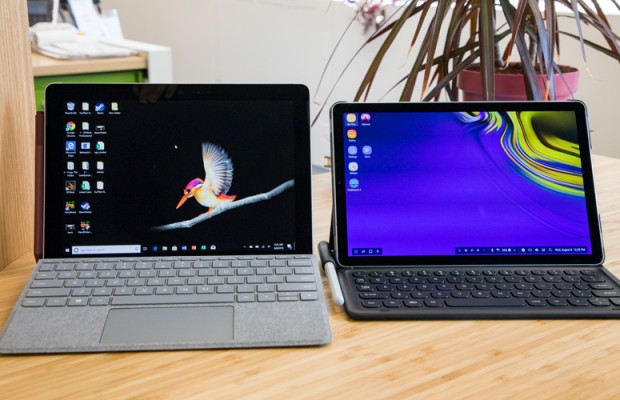Can the Surface Go and Galaxy Tab S4 Save the Tablet?
Sign up to receive The Snapshot, a free special dispatch from Laptop Mag, in your inbox.
You are now subscribed
Your newsletter sign-up was successful
Whispers of the tablet's demise have been happening for years. Why? Outside of Amazon's cheap and kid-friendly Fire slates and Apple's high-end iPads, new, important slates pop up as often as critically acclaimed Ben Affleck movies.
So why would Microsoft and Samsung release new tablets — the ultra-affordable Surface Go and the productivity-focused Galaxy Tab S4 — in 2018?
The demise of the tablet
It's not because of a healthy tablet market for consumers. Linn Huang, research director at IDC, noted that "slates are entering a 15th consecutive quarter of decline and are projected to continue to decline through our forecast period.
The small points of optimism for tablets (on their own) come from a market you might not think of that often. Carolina Milanesi, a consumer tech analyst at Creative Strategies, told me, "Enterprise, not consumer, is really the market Samsung is after." Specifically, "Samsung is very active in the enterprise space, where these kind of devices are being used for point of sale, in manufacturing, hospitality and health," she said.
Milanesi also said Samsung has loyal customers who might want a companion device for their Galaxy phone. This makes sense when you consider how iPads are companion devices to iPhones.
Will keyboards save the day?
Sign up to receive The Snapshot, a free special dispatch from Laptop Mag, in your inbox.
So, with all that bad news, why are we seeing these new tablets? Because these new devices are more than just tablets. They're slates that double as laptops.
"The Surface Go and potential future iterations of Windows detachables on [Qualcomm's] Snapdragon [chip] should help prop up the mid end of the Windows-detachables market that has largely been abandoned," Huang said.
For now, the Surface Go sports an Intel Pentium processor, but future iterations could run on ARM-based chips. We've tested some Snapdragon-based 2-in-1s with LTE built in, such as the $999 HP Envy x2, but the performance didn't justify the high $999 price.
MORE: Surface Go: Meet the $399 iPad Killer
The Samsung Galaxy Tab S4 uses an ARM chip in the Snapdragon 835, but it doesn't have the overhead of Windows to contend with. It runs Android and Samsung's own DeX desktop environment.
So, with the traditional tablet walking a slow march to the grave, it wasn't surprising for Samsung and Microsoft to position these new devices as laptops, selling detachable keyboards for an extra $150 to $100. But that 2-in-1 format isn't thriving, either."Detachables have sputtered in recent quarters" while being buoyed by a single line, Huang told me.
"The iPad Pro has really started to build momentum over the last year," Huang said. However, he cautioned that, although "we remain optimistic about the prospects of this category, we have become more pessimistic over time."
Where is that overall optimism coming from? The Android detachable remains a popular item for retailers during the holiday season," Huang said. So, the combination of longer-lasting, LTE-based devices and seasonal interest is enough to make "the roads look much better ahead" for device makers, even with the "potholes in recent years," he said.
Amazon's Fire tablets serve another purpose
But what of the tablet market's biggest giant, Amazon, which sells slates at supercheap prices? Milanesi said "there is no money to be made" in the ultracheap range that Amazon dominates, which may explain why its $49 Fire 7 tablet got marked down to $29 for Prime Day. "Larger phones have taken over that segment," she said.
Milanesi also told me that this is why we've seen tablets grow, rather than shrink, as "there is no 8-inch-tablet market anymore, and we have seen the size of tablets going up to 12.9 inches for the iPad Pro."
MORE: New Video Shows Galaxy Tab S4 in All Its Glory
But why would Amazon invest in an industry where there isn't much money to be made? "To Amazon, the Kindle Fire is a cog in a broader smart-home story," Huang said, where "the goal is more touch points for Alexa and for the company's content and marketplace."
Is Chrome OS a good bet?
You might have been surprised to see the Samsung Tab S4 use Android — where it has to make its own DeX desktop mode — and not Chrome OS, which already has a desktop mode.
Huang agreed, saying, "The entry of Chrome detachables with HP's Chromebook x2 also shows promise as both an education device and a consumer device, given Google's integration efforts with Android apps on Chrome OS."
But in terms of existing success and failure, Milanesi noted that, while Chrome OS devices are still "mostly in education, rather than a big consumer play," Samsung isn't picking a side yet, as the company still makes Chromebooks.
Outlook
It appears that demand (which typically sparks innovation) for tablets isn't taking place within stand-alone slates anymore. There's a bifurcation of the market now, with ultracheap Amazon slates on one side and premium, big-screen, productivity-focused tablets on the other. The latter category is where the excitement is, because the line is blurring between tablets and laptops. And with 5G around the corner, a new wave of always-connected 2-in-1s — whether powered by Windows, Android, Chrome OS or iOS — will be vying for your attention and dollars.
Henry was a contributing writer at Laptop Mag. He penned hundreds of articles, including helpful how-tos for Windows, Mac, and Gmail. Henry has also written about some of the best Chromebooks, and he has reviewed many Apple devices, including various MacBook Air laptops. He is now a managing editor at our sister site Tom's Guide, covering streaming media, laptops, and all things Apple.

